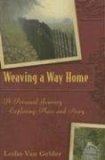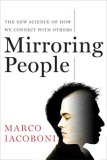‘Weaving a Way Home’ by Leslie Van Gelder
May 14, 2008
 Weaving a Way Home: A Personal Journey Exploring Place and Story by Leslie Van Gelder (University of Michigan Press, 2008).
Weaving a Way Home: A Personal Journey Exploring Place and Story by Leslie Van Gelder (University of Michigan Press, 2008).
I received this book through the LibraryThing Early Reviewers program, though in this case it wasn’t really early, since the book came out in March. The subtitle well expresses what the book is about — the author’s personal, often poetic, reflections on place and story. “Place” was emphasized much more than “story”; perhaps the theme could be described as “how people relate to places through story.”
Van Gelder first looks at the notion of “wilderness” in relation to similar concepts of “wildlands” and “the wild.” Then the idea of “home” is examined and finally the attraction of “ruins.” The last part of the book works out a contrast between “anthropomorphizing” and “anthropocentric” cultures.
Here is an excerpt on the difference between being from a place and being of a place (p. 58-59):
The ambiguity of the question “Where are you from?” stems from the English language itself because the very expression means that you are not “from” where you are now. … Modern day English does not allow the preposition with which the French take comfort: of. Lancelot du Lac was Lancelot of the Lake, and when asked in France where I am of, I do not answer in terms of location so much as ancestry and emotion. Of asks me “Where are my people and where am I home?” because when I leave that place I have only left it physically and am still possessed by it. Of is a statement of relation, from a point of departure.
I also liked this quote (p. 45):
Edmund Carpenter writes in ‘Eskimo Realities‘ of the Inuit approach to language not as a form of labeling the known but as calling forth from formless into form. “Words do not label things already there,” he writes, “Words are like the knife of the carver: they free the idea, the thing, from the general formlessness of the outside. As a man speaks, not only his language is in a state of birth, but also the very thing about which he is talking.”
Van Gelder and her husband, Kevin Sharpe, study Paleolithic cave art in France. Here is a link to a paper on Children and Paleolithic ‘Art’




